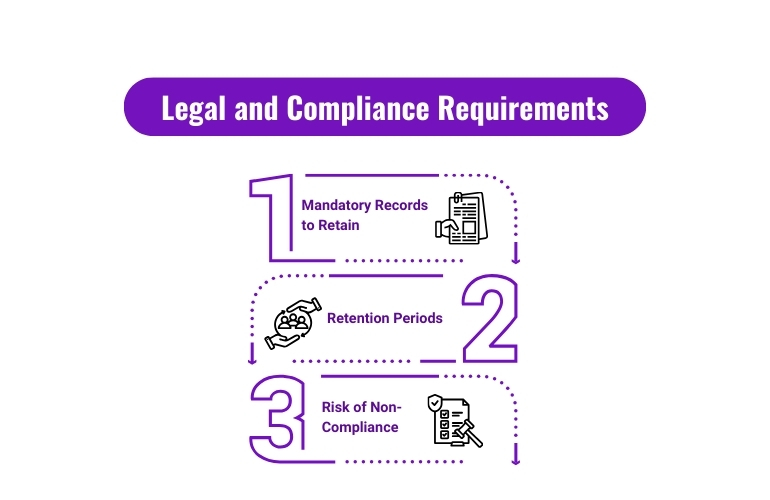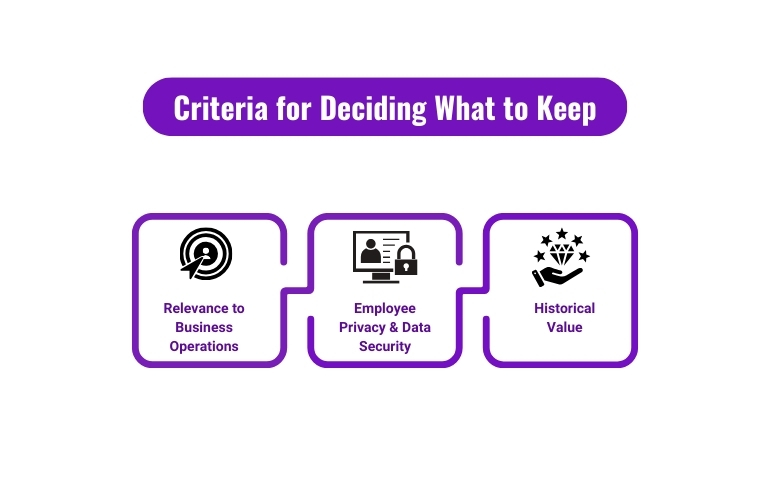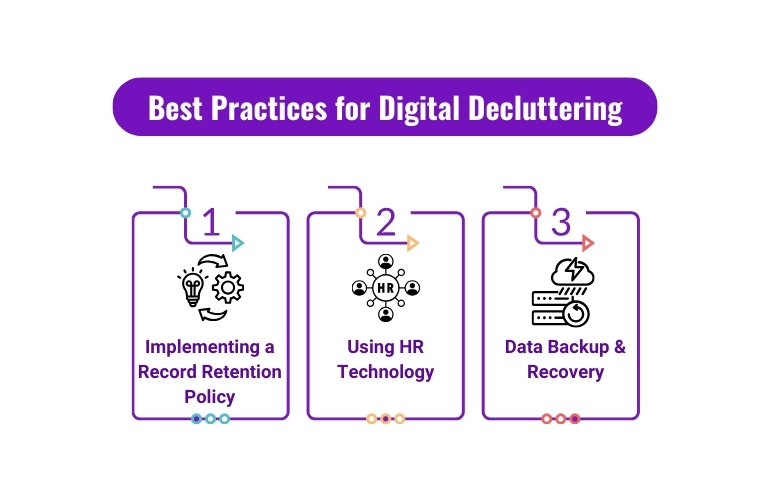The digital transformation in India is nothing short of revolutionary, and the HR sector is at the forefront of this change. With the ease of storing and accessing information digitally, HR departments across the country are witnessing an influx of data. But amidst this flood of information, how do you determine which HR records are essential to keep and which can be safely discarded? Welcome to the world of digital declutter!
In this blog, we’ll explore the concept of digital decluttering within the HR domain, discuss the legal requirements for HR record retention, and provide best practices for managing your digital HR records efficiently.
The Evolution of HR Records Management in Digital India
From Paper to Digital: The Transformation
Gone are the days when HR departments were drowning in mountains of paper. The shift from traditional paper records to digital record-keeping has been a game changer. Not only has it made accessing information easier, but it has also reduced the physical space required to store records. However, this transition also brings the challenge of managing vast amounts of digital data.
Government Initiatives: Driving Digital Change
India’s Digital India initiative has been a significant driving force behind this transformation. With a focus on making India digitally empowered, the initiative has impacted every sector, including HR. Companies are now required to maintain and manage records digitally, making it easier for them to comply with regulations and streamline their HR processes.
The Challenge of Over-Accumulation
But with great power comes great responsibility. While digital records offer convenience, they also lead to over-accumulation. It’s easy to fall into the trap of keeping everything, leading to a cluttered digital workspace that can make it challenging to retrieve important information when needed. So, how do you avoid this clutter and keep only what’s necessary?
Legal and Compliance Requirements
Mandatory HR Records to Retain
First things first, let’s talk about what you’re legally required to keep. In India, certain HR records are mandatory and must be retained for specific periods. These include employee contracts, tax records, compliance documents, and more. For instance, employee contracts need to be retained throughout the duration of employment and for several years thereafter, depending on the relevant laws.
Retention Periods: Know the Rules
Understanding the legal retention periods is crucial. Different HR records have different retention requirements under Indian laws, such as labor laws and tax regulations. For example, payroll records need to be kept for a minimum of eight years, while records related to employee benefits may have different retention periods. Keeping up with these regulations ensures your company stays compliant and avoids potential legal and financial penalties.
Risk of Non-Compliance
Failing to retain essential HR records can lead to severe consequences. Non-compliance can result in hefty fines, legal disputes, and damage to your company’s reputation. It’s not just about keeping records; it’s about keeping the right ones for the right amount of time.
Criteria for Deciding What to Keep
When deciding what to keep, start by considering the relevance of each record to your business operations. Ask yourself: Is this information critical for ongoing or future business processes? If the answer is yes, it’s a keeper.
Employee Privacy and Data Security
Balancing data retention with privacy concerns is essential, especially under regulations like the Indian Data Protection Bill. Only retain records that are necessary, and ensure that sensitive information is stored securely to protect employee privacy.
Historical Value
Some records might not be immediately relevant but could have long-term value for historical or strategic purposes. For example, records related to past employee performance or major company decisions can provide valuable insights in the future.
Best Practices for Digital Decluttering
Regular Audits: Clean Up the Clutter
Conducting regular audits of your HR records is one of the best ways to keep clutter at bay. Set up a routine to review and identify unnecessary records that can be safely deleted or archived.
Implementing a Record Retention Policy
A well-defined record retention policy is your roadmap to digital decluttering. This policy should outline what records need to be kept, how long they should be retained, and the process for their disposal. Ensure that all HR staff are aware of and follow this policy.
Leveraging HR Technology
HR Management Systems (HRMS) can be your best friend when it comes to digital decluttering. These systems can automate record-keeping, archiving, and deletion processes, ensuring that only the necessary records are kept and everything else is efficiently managed.
Data Backup and Recovery
Even with decluttering, it’s vital to ensure that critical records are backed up and can be recovered in case of data loss. Regular backups and a solid recovery plan are non-negotiable.
The Role of Automation and AI in Record Management
Automating Retention and Deletion
Automation can take your digital decluttering to the next level. AI-driven tools can categorize records and automatically delete those that are no longer necessary, saving you time and reducing the risk of human error.
Smart Search and Retrieval
AI-powered search capabilities can enhance your efficiency by allowing quick access to important records. No more sifting through endless files—find what you need in seconds.
Predictive Analytics for Future Needs
Predictive analytics can help streamline what records to keep by analyzing trends and predicting which records will be needed in the future. This helps you make informed decisions about record retention.
Case Studies: Successful Digital Declutter in HR
Case Study 1: Leading the Way
Take the example of a leading company in India that implemented a successful digital declutter strategy for HR records. By leveraging AI and automation, they could reduce their digital footprint while ensuring compliance and improving record accessibility.
Case Study 2: Lessons Learned
On the flip side, another company faced challenges due to poor digital record management. Their experience underscores the importance of a clear strategy and the right tools.
Conclusion
Digital decluttering is not just about cleaning up your digital workspace; it’s about ensuring that your HR records are manageable, accessible, and compliant with legal requirements. By following the best practices outlined above and leveraging technology, HR departments can stay ahead in the digital age and maintain an efficient and clutter-free record management system.
So, take the plunge! Start decluttering your HR records today and pave the way for a more streamlined and effective HR department.





